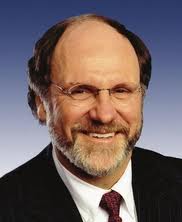 There's a man in the news with twinkly eyes, rimless spectacles, and a lush white beard. But instead of bearing gifts, he's ignoring warnings about European debt risk and gambling with what is thought to be $1.2 billion of missing customer money in his former role as CEO of the now-bankrupt firm MF Global. In the headline of a story I did for class last month, I likened Mr. Corzine to the fabled Emperor who believes he's wearing fine robes when in fact he is nude. I was delighted to see that Financial Times' writer John Gapper chose the same analogy and ran with it, in this brilliant piece. Meanwhile, here's my stab at it.
There's a man in the news with twinkly eyes, rimless spectacles, and a lush white beard. But instead of bearing gifts, he's ignoring warnings about European debt risk and gambling with what is thought to be $1.2 billion of missing customer money in his former role as CEO of the now-bankrupt firm MF Global. In the headline of a story I did for class last month, I likened Mr. Corzine to the fabled Emperor who believes he's wearing fine robes when in fact he is nude. I was delighted to see that Financial Times' writer John Gapper chose the same analogy and ran with it, in this brilliant piece. Meanwhile, here's my stab at it.
“That Robe Looks Fabulous on You, Emperor.” Why did no one raise any alarms on Corzine’s big European bets?
NEW YORK CITY -- Now that its bankruptcy papers have been filed, observers of the collapsed brokerage firm-turned-investment bank MF Global are asking: why did no one see this coming?
The signs were there. Since former Goldman Sachs executive Jon Corzine took over the firm in April 2010, it scaled up its proprietary trading business until it was leveraged nearly 40 to one as recently as June of this year. By comparison, Lehman Brothers was leveraged at 35 to one at the time of its collapse.
Over 10% of its assets were long-term peripheral European government bonds, most of which were due to mature towards the end of 2012. As the Eurozone crisis intensified in recent weeks, investor lack of confidence caused capital to flee, resulting in downgrades from ratings agencies Moody’s and Fitch’s.
But asking whether that strategy could have succeeded in a different investment climate, or what was driving Corzine to take on so much risk, misses the point, said Joseph A. Cotterill, who has been covering MF Global for the Financial Times’ Alphaville blog.
“For me, the real question isn't so much about why MF Global turned into a massive proprietary trading outfit, it's why no one stopped them -- auditors, ratings agencies, and so on,” he said.
There is no one answer, and observers have pointed to several factors that could have made it difficult to put the brakes on Mr. Corzine’s ambitious strategy: his Goldman Sachs “halo,” the politician connections he brought from his career as a New Jersey senator and governor, and internal structure and personnel problems at MF Global.
Francine McKenna, who blogs about the “Big Four” auditing agencies at re: the Auditors and is a regular contributor to American Banker and Forbes, believes the auditing agencies failed to honestly evaluate MF Global’s long-term prospects.
“Their job is to go in, look at the internal and external figures, and decide ‘What is the likelihood that this company is going to survive the next 12 months?,’” she said. A company with MF Global’s risk levels should have been marked with a “qualified concern” rating as far back as last December.
“Given their losses over the last three years, there was a reasonable expectation that one of the auditors should have said, ‘I think we need to raise our hand and say this firm is in potential danger of not being here 12 months from now,’” she said.
Over the past two years, Fitch and Moody’s credit ratings reports have consistently reflected a “negative outlook” on MF Global. But continued confidence from Standard and Poor’s, an agency to which Mr. Corzine has close ties through former Goldman colleagues, delayed the inevitable crash, according to Ms. McKenna. Standard and Poor’s rated the company “stable” in December 2010. A “qualified concern” rating, on the other hand, would have called the company’s credit lines and debt liens into question, since those covenants require a clean opinion to hold.
“The auditors don’t want to be the ones to light the match, because changing their opinion has automatic consequences,” she said. “All the things you’re dealing with now would have happened then.”
In an article for American Banker, Ms. McKenna noted that many of Mr. Corzine’s inner circle of advisors were men he had known for years, and as such were unlikely to provide a lucid, outsider’s perspective. For example, MF Global’s Chief Financial Officer, Henri Steenkamp, came from PricewaterhouseCoopers, which audited Goldman Sachs for the many years he was there.
Yesterday, the firm filed for chapter 11 bankruptcy, news followed by reports of hundreds of millions of dollars gone missing. This prompts another important question, said Ms. McKenna.
“How do you make sure that anyone’s looking out for the shareholders?”